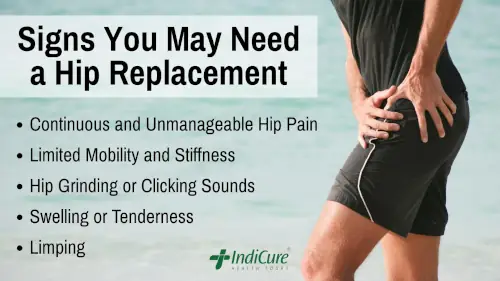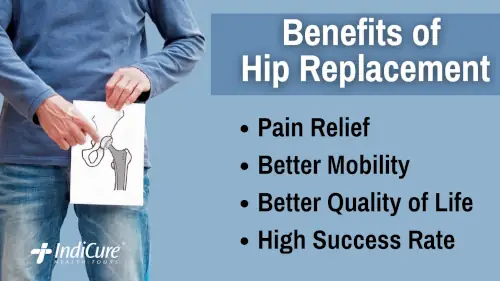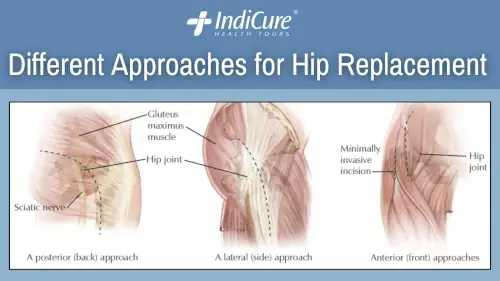How Do I Know When I Need a Hip Replacement? Get Expert Insights

Introduction
When it comes to a major surgery such as Hip Replacement, you must be very sure that you are a good candidate and that it is the right time to undergo hip replacement. Hip replacement surgery is often considered only after other treatments like medication, physical therapy, or lifestyle changes have failed to provide relief. It's a decision that requires careful thought, as factors like recovery time, post-operative care, and lifestyle adjustments must all be considered thoughtfully and realistically.
Taking the time to understand what a hip replacement surgery entails, what the rehabilitation process looks like, and how it may affect your daily life will help you prepare both physically and mentally for the journey ahead.
If you are suffering from debilitating pain and are wondering 'How do I know if I need a hip replacement?', this blog is for you! Though not a substitute for medical advice, the blog aims to help you make an informed decision about your hip replacement surgery.
Knowing the signs and symptoms and other intricacies that indicate it's time for surgery can help you make a thoughtful choice and ensure better long-term outcomes.
How Do I Know When I Need a Hip Replacement?
Let us dive straight into the answer to the question you are here for, and that is 'how do I know when I need a hip replacement?' Well, the simple answer is that when the persistent pain in the hip severely affects your daily activities, restricts your mobility, doesn't respond to conservative treatments, and significantly impacts your quality of life, hip replacement can be a good option.
Here's a more detailed look at the signs and symptoms:

-
Continuous and Unmanageable Hip Pain:
-
Inexorable Pain:
Pain in or around the hip joint, groin area, or even in front of the thigh, sometimes radiating down to the knee, can be caused by hip arthritis. A hip replacement may be required if the pain does not go away even after trying conservative measures, including injections, physical therapy, and pain medications.
-
Pain that affects day-to-day tasks:
If simple daily activities like getting dressed, walking, climbing stairs, or even sitting comfortably are getting difficult, it is a warning sign that you need a surgical intervention.
-
Pain at rest or even while you sleep:
You should see a specialist if your hip pain is so bad that it interferes with your sleep or persists even when you are not moving.
-
Inexorable Pain:
-
Limited Mobility and Stiffness:
-
Range of motion loss:
If bending, rotating, or moving your hip becomes difficult, which indicates stiffness, or if you suffer from loss of range of motion, it might be a sign of joint damage.
-
Trouble with simple movements:
Your hip joint may be severely affected if you are having trouble with simple movements like getting out of a chair, putting on socks, or walking without pain.
-
Stiffness in the morning or after resting:
An important sign of joint inflammation or damage is experiencing stiffness, especially in the morning or after rest, which should be taken seriously.
-
Range of motion loss:
-
Additional Signs and Symptoms:
-
Hip Grinding or Clicking Sounds:
If you hear or feel a grinding or clicking sensation when you move your hip, it could be a sign of joint damage.
-
Swelling or Tenderness:
Another important sign of inflammation of the hip is swelling or tenderness around the joint. If you feel you have persistent discomfort, warmth, or visible swelling in the area, it may be a sign that the joint is inflamed.
-
Limping:
If you develop a limp or find yourself favouring one leg, it could indicate a problem with the hip joint.
If you experience one or more of the symptoms mentioned above, it's important to consult an orthopedic surgeon for an accurate diagnosis and to explore your treatment options. That's the best way to find the answer to "How do I know if I need a hip replacement?"
Hip Replacement is a major surgery, and you must know the potential benefits and risks before you choose to undergo the procedure.
If and when you need a Hip Replacement needs due deliberation, your doctor shall recommend conservative treatments first, but may recommend surgery if your condition is severe.
-
Hip Grinding or Clicking Sounds:
Benefits & Risks of Hip Replacement
Hip replacement surgery can allow you to enjoy daily activities with greater ease and comfort. Here are some key benefits of undergoing hip replacement surgery:

-
Pain Relief:
An arthritic hip can affect all areas of your life, ranging from mobility to poor quality. But the most important benefit of hip replacement is pain relief. The surgery offers complete pain relief in a few weeks.
-
Better Mobility:
The next important benefit after pain relief is greater strength and movement. Individuals after hip replacement surgery are able to walk and climb stairs without any support or assistance.
-
Quality of Life:
Better quality of life is an understated benefit when compared to other benefits mentioned above. It is like reclaiming your life, the ability to walk, do daily chores, and climb stairs without pain and support. The ability to do these simple tasks on their own has extremely beneficial effects on the mental well-being of the patient. Almost all patients report better physical and mental well-being after a hip replacement.
-
High Success Rate:
The surgery boasts a very high success rate. More than 95% of patients are very happy with the results of the surgery. Besides, the results of the surgery last for 20-25 years, which can amount to a lifetime for many patients.
But like any major surgery, hip replacement also comes with potential risks and complications that should be carefully considered with your doctor. Some of them are:
- Infection: Although the surgeons take extreme care to make sure that the operated area stays infection-free, there can be times when the patient contracts an infection. Most of the times, a course of antibiotics take care of this. But in very rare cases, when the implant area gets infected, another surgery may be needed.
- Blood Clots: Blood clots can happen at any surgery site. And the same goes for hip replacement as well. This happens because of the inactivity during and after the surgery. After THRs, the clots can develop in the veins in the legs or in the pelvic region.
- Chances of Dislocation: One of the risks you may encounter is loosening of the ball of the replaced joint. Your doctor can help correct this by placing a brace, realigning it non-surgically under anaesthesia, but in severe situations, performing a follow-up surgery becomes necessary. It is thus important to restrict positions that your doctor advises against, and adhere to the physiotherapy and exercise recommendations to prevent this.
- Change in Limb Length: There may be a chance that your legs become uneven by a few millimeters because of the contracting or stretching of tissues around your hip. Your surgeon will take all the precautions to avoid it, but this is a possible risk of the surgery.
- Loosening of Implant: When properly cared for, the hip implant can survive for 20 years or longer. However, if there is significant wear and tear or if the replaced joint has not entirely adhered to your bone, it may become loose over time. This is uncommon with modern implant materials, but surgery may be necessary if it occurs and begins to cause significant discomfort.
- Fracture of Healthy Areas: Certain healthy hip joint components may break during surgery. Smaller fractures heal on their own as long as you take the correct medications and maintain a healthy diet, but larger ones may need extra support from a metal plate, wires, or pins. For a few months after surgery, a very nutritious diet is required, with an emphasis on protein, calcium, and vitamins.
What Happens During a Hip Replacement?
Hip replacement involves removing and replacing damaged hip joint components with an artificial joint called a prosthesis. The prosthesis is made of metal or ceramic, or hard plastic and relieves the pain associated with the worn-out hip joint and enhances function, thereby improving the quality of life.
The surgery is done either under spinal or general anaesthesia, and usually takes 2-3 hours. The surgeon begins by making an incision over the hip, through the layers of tissue, and removes the damaged and diseased bone and cartilage. The replacement socket is then put into the pelvic bone, and a metal stem is inserted into the top of the thighbone, which is then topped by a replacement ball.
The surgeon then closes the incision, and you are sent to your room for recovery and rehabilitation.
Different Approaches for Hip Replacement

Hip replacement can be performed from the front (anterior), side (lateral), or back (posterior), with each technique having its own set of advantages and disadvantages
Recovery after Hip Replacement
Recovery after hip replacement can be divided into 3 phases: Immediate, Intermediate, and Long-term Recovery.
- Immediate recovery includes pain management, wound care, physical therapy, walking with assistive devices, and abiding by restrictions. This phase lasts for the first couple of weeks.
- Intermediate recovery is for 2-3 months, which involves increasing strength and endurance, returning to daily activities, and a reduction in pain and swelling.
- Long-term recovery after hip replacement entails building strength and mobility, returning to work, resuming low-impact activities, and getting back to normal life.
Frequently Asked Questions About Hip Replacement
-
Till what age can hip replacement be done?
There is no age limit to undergo a hip replacement surgery. If you are otherwise healthy, wish to lead an active life, and can tolerate the surgery, hip replacement can be done at any age.
-
Would the surgeon be able to make out from the X-ray if I need a hip replacement?
While X-ray does show bone damage and hip arthritis, it is not a definitive test to say that you need a hip replacement. Various other factors and tests are taken into consideration before recommending a hip replacement.
-
What if I do not get a hip replacement done?
Worsening of arthritis pain, more sedentary lifestyle leading to weight gain, muscle weakness and loss of muscles, poor quality of life, poor mobility, increased risk of falls and injuries, and longer recovery time are some of the downsides you may face, if you do not choose to undergo the surgery. It is thus crucial to know when you need a hip replacement and to undergo the surgery before it is too late.
-
How long does the surgery take?
The surgery takes around 2-2.5 hours, which includes preparation for the surgery.
-
Would a blood transfusion be needed during the surgery?
Not always. Depends on your haemoglobin level and other factors.
-
What is the success rate of hip replacement?
Hip replacement is a fairly successful surgery. Approximately 95% of people who have hip replacement surgery report significant pain relief and better mobility. The long-term success rate is also good, with 90-95% of replacements lasting 10 years and 80-85% lasting 20 years.
-
How long does the replaced hip last?
Modern hip replacements are designed to last for life, with most lasting 20 years or even longer. However, factors like age, activity level, co-morbidities, or other health factors do influence the life of the hip joint.
-
How long would I need to use a walker?
Most people use a walker or crutches for 2 to 4 weeks, but it varies from patient to patient. Your surgeon would advise you on how long you should be using one after examining your progress.
-
How long will it take for the hip incision to heal?
The incision is covered with the dressing and typically takes around 5-6 weeks to heal.
-
When do I need to start the rehabilitation therapy after hip replacement?
As soon as possible after the surgery, ideally within 24 hours of the surgery. This includes gentle movements and exercises. Starting gentle movements helps prevent blood clots and promotes faster recovery. This also helps in regaining range of motion and strengthening the muscles.
-
What is considered "normal" pain after the surgery?
It's normal to feel some pain following surgery, particularly during the initial days, but this pain should be tolerable and should get better over time as you recover. It becomes concerning if the pain is severe, gets worse over time, or does not go away with prescription drugs. You must talk to your surgeon immediately in that case.
-
When can I return to normal activities after hip replacement?
You should return to normal activities like walking, performing daily tasks, swimming, and cycling in 6-12 weeks after the surgery. High-impact activities, however, would take a few more weeks, depending on your progress and activity level.
-
What is the 90 degree rule with hip replacement?
The 90 degree rule is a crucial precaution to protect the new hip during the initial healing period. The rule refers to avoiding bending the hip joint beyond 90 degrees to minimise the risk of dislocation and ensure proper healing.
-
What activities are not allowed after hip replacement?
High-impact activities like running, jogging, jumping, and lifting heavy weights should be avoided. These are essential guidelines for your immediate recuperation, but they also apply to your long-term safety measures. Both leaning forward and elevating your knee to cross your legs can injure you, so it's crucial to avoid overextending yourself.
-
Which method of hip replacement is the best?
There is NO SINGLE BEST METHOD for hip replacement. All approaches have their advantages and disadvantages. The most suitable method or approach depends on individual patient factors and the surgeon's expertise in using that approach.
The Last Word by IndiCure Health Tours
Hip Replacement is a major surgery and should be taken up after due deliberation. You must know if and when you need a hip replacement, and you should be physically and mentally prepared for it. You must also know who your surgeon is, how experienced and qualified he/she is, how many hip replacements they have done, what their success rate is, and what kind of post-operative care and recovery support you can expect.
Having clear answers to these questions not only builds trust but also empowers you to make a confident, well-informed decision about your health.
If you're still wondering, "How do I know when I need a hip replacement?", don't worry. IndiCure Health Tours, one of the most trusted medical tourism facilitators in India, can help you get an expert online medical opinion from some of the best hip replacement surgeons in India. From there, you can plan your trip and undergo affordable, world-class hip replacement surgery at India's top joint replacement hospitals.
Interested? To get a consultation or a free quote, reach out to IndiCure Health Tours today. WhatsApp us at +91-932-003-6777 or email us at info@indicure.com.